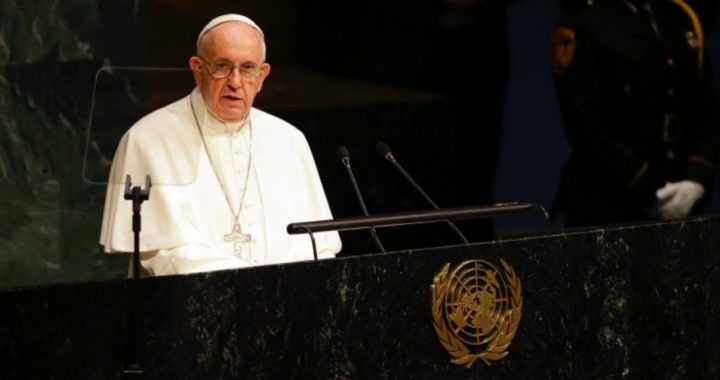
As Pope Francis rounds out his nine-day trip to North America with a visit this weekend to Philadelphia and the 2015 World Meeting of Families, media coverage of his historic visit is instead centered on his remarks during the past week regarding climate change. From his discussion with Fidel Castro on Sunday, September 20 to speeches at the White House and Congress, the pontiff’s theme has been a continual plea for protecting the environment from “human activity” and promoting so-called “sustainable development.” The topic was indeed the central focus of his 30-minute address to the United Nations General Assembly on Friday, in which he likened environmental abuse to social injustice.
Framing the issue in moral terms and proclaiming the existence of a “true ‘right of the environment,'” he reasoned that since mankind needs healthy surroundings in order to survive, “any harm done to the environment, therefore, is harm done to humanity.” Francis went on to blame environmental degradation on “a selfish and boundless thirst for power and material prosperity.”
Not once in any of his speeches has Pope Francis prescribed specific policies, but he is clearly in favor of increased government regulation in both national and international spheres. He has praised President Obama for his leftist climate change initiatives, urged Congress to implement “courageous actions and strategies” aimed at limiting technology and power, and congratulated the United Nations on its 70 year history, stating that without its “interventions on the international level … mankind would not have been able to survive the unchecked use of its own possibilities.”
Moreover, in obvious approbation of the UN’s Sustainable Development Goals, Pope Francis made his remarks on Friday to what the New York Times cites as the largest gathering of world leaders in UN history, immediately prior to the opening of the 2015 UN Sustainable Development Summit, which concludes on Sunday. UN Sustainable Development Goals form the core of the international body’s Agenda 21 program, formulated at the 1992 Earth Summit. The John Birch Society describes Agenda 21 as a plan “for the global control and restriction over your daily life, including your private property, individual rights and civil liberties — all in the apparent name of the environment and so-called social justice.”
And by frequently citing throughout the course of the week his own environmental encyclical “on the Care of Our Common Home,” Laudato Si, Pope Francis has made it clear that he looks to world government as the answer to the scientifically discredited notion of human-caused global warming, along with a host of other ills. Specifically, the encyclical states:
To manage the global economy; to revive economies hit by the crisis; to avoid any deterioration of the present crisis and the greater imbalances that would result; to bring about integral and timely disarmament, food security and peace; to guarantee the protection of the environment and to regulate migration: for all this, there is urgent need of a true political authority.
What is the ultimate goal of his collectivist strategies? Francis rarely speaks without mentioning that; he wants to end poverty once and for all. As the president welcomed him to the White House on Wednesday, the pope appealed to “all men and women of good will in this great nation” to “protect the vulnerable in our world.” He advised Congress: “The fight against poverty and hunger must be fought constantly and on many fronts.” And he rallied UN delegates with the words: “It must never be forgotten that political and economic activity is only effective when it is … constantly conscious [that] we are dealing with real men and women who live, struggle and suffer, and are often forced to live in great poverty, deprived of all rights.”
Yet some question whether radical environmental policies and UN Sustainable Development Goals are the real solution to poverty. “His call for limiting technology is worrisome, echoing the harping of leftist Luddites who despise modern technology and long for a return to fictitious agrarian simplicity,” writes Charles Scaliger for The New American. “The fact is that technology has raised the standard of living for all Americans (and most of the rest of the world as well), giving billions access to medicines, telephones, the Internet, modern transportation, and the many other benefits of modern life.”
“Only economic growth has ever produced broad amelioration of poverty,” writes George Will in the Washington Post, “and since growth began in the late 18th century, it has depended on [fossil] fuels.” Will warns that, far from aiding the impoverished, Francis’ political campaigning will likely only undermine his credibility on all fronts. “Secular people with anti-Catholic agendas drain his prestige, a dwindling asset, into promotion of policies inimical to the most vulnerable people and unrelated to what once was the papacy’s very different salvific mission.”
Photo of Pope Francis: AP Images




